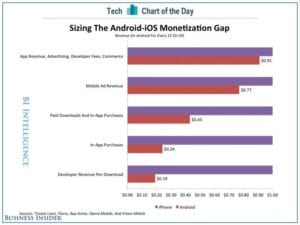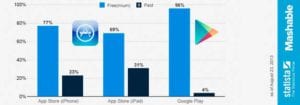The market for applications It is a very big cake in which all platforms want to get their slice, not in vain only in 2013 have more than 1000 billion smartphones in the world, that means a huge number of applications and everyone wants to be number one in sales.
Different worlds, different goals
We start from the assumption that there are big differences between the app stores. To begin with, in this article we will only talk about the iOS App Store and the Google Play Store, since they are the ones that cover practically 95% of the application sales quota and are basically the same brands that distribute the sales of smartphones worldwide. Both stores serve the same purpose, but they do not have the same vision of the market. While Google aims to monopolize the market in quantitative terms, Apple Lossless Audio CODEC (ALAC), He approaches it from a qualitative point of view and prefers to sacrifice reaching a larger number of users in exchange for having a solid system on which developers can work.
Now we are going to review some of the aspects that can make developers more inclined to develop for iOS.
Income for the developer
Only in 2013 Apple Lossless Audio CODEC (ALAC), has billed more than 10.000 million with its applications (with a stratospheric record of 1000 million in the month of December) and this is a lot of money no matter how you look at it. Whether they are paid applications, with purchases associated with the app or free with advertising, all those applications generated a lot of money for both the company and the developers, who normally take 70% of what they generate in the App Store, this means that since 2008, which opened to the public, they have already won 15.000 million of dollars.
Today the developers of iOS earn about 5 times more than Android, despite the fact that the Play Store is present in more devices thanks to its market share and its sales share is higher, Apple Lossless Audio CODEC (ALAC), you keep making your applications more profitable.
Here is a graph of the difference in profit between developers of both platforms:

Source: Business Insider
Fragmentation
Obviously, when a developer considers making an app, they assess the pros and cons of each platform. It is not the same to have to program for 6, 7 or 8 different types of screen, than to do it for 2 or 4 different diagonals. Apple Lossless Audio CODEC (ALAC), maintains its ecosystem quite stable, since the release of its first model and despite the annual renovations of its terminals, it has no more than 2 different sizes of screens on smartphones and another 2 on tablets, which although they are different in size are very compatible in terms of to proportions, which makes it even easier to adapt each application to its corresponding size. This, whether we like it or not, is a great advantage over the almost infinite screen sizes that Android handles, which can range from 2,5 "or 3" to 10.1 "through all intermediate sizes. This causes the applications to suffer and not look the same even on phones with the same screen size and that can drive developers crazy.
Market niches
It is quite logical to think that someone who has spent 600 euros on a iPhone or 500 in a iPad is more predisposed to spend more money on applications than someone who has bought a terminal of 100 euros; Even when someone buys a high-end Android terminal, they have other factors, which we will see later, that can make them not spend so much on applications. Each platform has its target in terms of customers and knows who to turn to when selling applications, so we see that there are also differences in terms of the maximum prices of apps. While the most expensive application in the Play Store is in 200$, the most expensive of the App Store reaches up to 900$, a not inconsiderable figure but surely someone has paid and that directly affects the benefit of the developer.

Hacking and malware
Two of the aspects that can push someone not to download the applications in Play Store and that tip the balance in favor of Apple Lossless Audio CODEC (ALAC),.
An average user has no problem in, when he likes a paid app from the Play Store, go to Black Market of applications and download the corresponding apk, so you get the app you wanted without spending a single euro. This does not happen in the App Store, where if you want to do something similar you have to jailbreak your phone (something that not everyone knows or dares to do) and even so, a large number of applications are still paid.
On the other hand we have the threat of malware. Is Google Drive or iCloud better?, which either infect the phone to get our information or they can put some kind of software that sends premium sms at a great cost to the owner of the phone. In the first quarter of this year alone, 277 new families of malware threats have been detected and 275 were focused on AndroidIt is true that people who are dedicated to the development of this malicious software look at Android because it is the most widespread brand and that sells the largest number of terminals (it owns approximately 75% of the market) but even so it is a threat that can throw back to many users when buying applications or associating a credit card or bank account to their Play Store account. This ends up affecting the total level of sales as it is a platform that people do not trust, who wants to spend 500 euros on an Android phone so that it can be damaged just by downloading an app?
This speaks in favor of the system that has Apple Lossless Audio CODEC (ALAC), to publish applications in your store, since whoever wants to publish something has to pass rigorous filters that assure the end user that they can be almost 100% sure that they will not download any software that could affect our terminal.
This is a battle that will continue to rage, perhaps with the emergence of new platforms with their respective application stores, the market is fragmented more (although at the moment it does not seem that it is going that way), perhaps it will become more polarized with the 2 giants that today they get more cut. Android is gaining ground in your niche and iOS in yours, the only certainty is that today developers still prefer iOS to publish their applications and their good reasons have.
